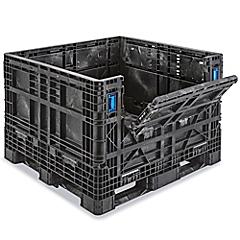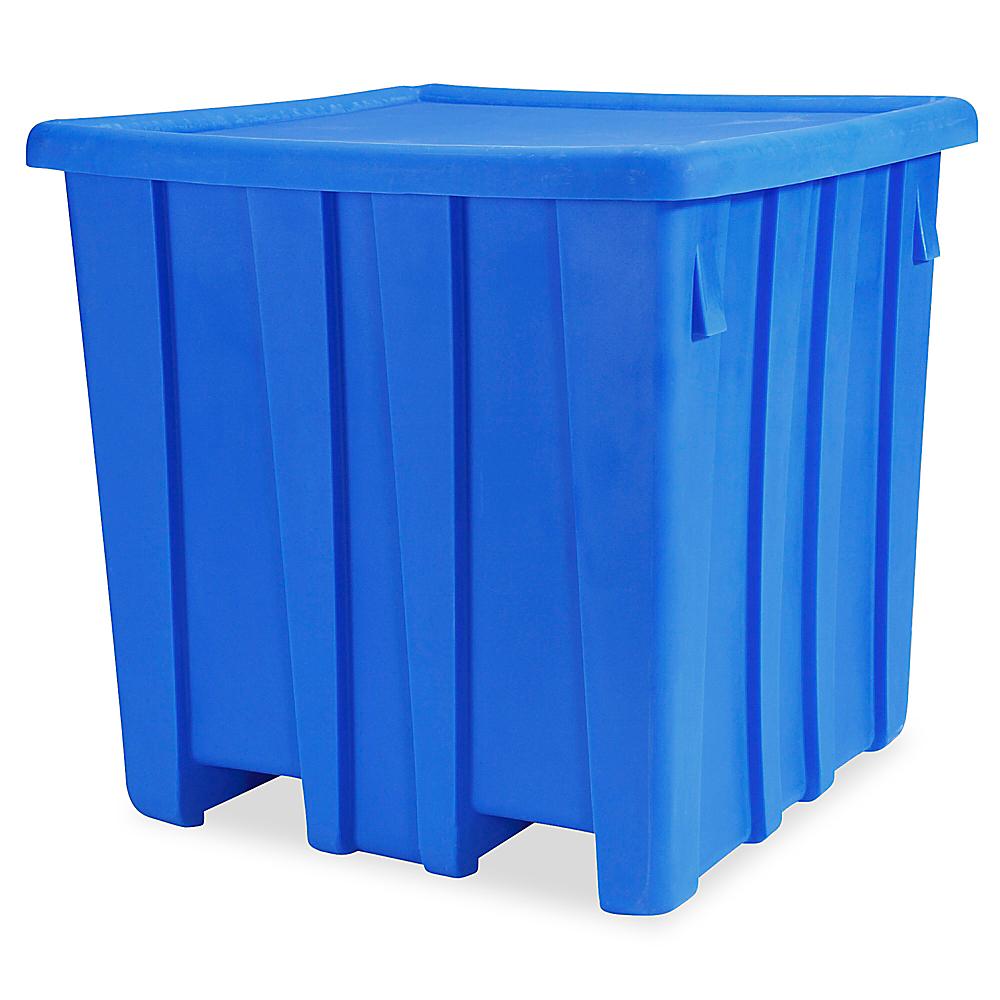Why more companies are choosing plastic bulk containers for clean storage
A Comprehensive Guide to the Different Kinds Of Mass Plastic Containers Available Today
Mass plastic containers play a crucial role in various sectors, using options for storage space and transport. Their diverse types deal with various demands, from stiff options for solid products to versatile containers accommodating various forms. Each kind provides unique advantages, making it necessary to understand their applications and attributes. As sectors progress, so do the needs for reliable container services. What factors should one think about when selecting the right mass container?
Introduction of Mass Plastic Containers

Kinds Of Bulk Plastic Containers
Bulk plastic containers come in different types, each fit to certain applications. Inflexible mass containers, adaptable mass containers, and intermediate mass containers stand for the key categories, each offering unique advantages. Recognizing these types is important for selecting the best container for delivering and keeping products.

Stiff Mass Containers
Stiff bulk containers are vital for effective storage and transportation of various materials throughout sectors. These containers are commonly built from sturdy plastics, allowing them to withstand severe handling and environmental problems. They are available in different forms and dimensions, consisting of bins, totes, and drums, making them appropriate for saving every little thing from granular compounds to liquids. Rigid containers commonly include enhanced wall surfaces and safe covers, guaranteeing the components remain protected throughout transit. Their stackable design takes full advantage of storage space, making them suitable for storehouses and manufacturing centers. Furthermore, many inflexible bulk containers are reusable and recyclable, adding to sustainability initiatives. On the whole, their toughness and convenience make inflexible bulk containers a crucial component in supply chain procedures.
Flexible Mass Containers
Flexible mass containers, typically referred to as flexible intermediate bulk containers (FIBCs), act as a versatile option for delivering and storing a selection of dry products. These containers are usually made from woven polypropylene and are created to be light-weight yet strong, enabling reliable handling and stacking. Their versatility allows them to accommodate different forms and sizes, making them appropriate for items varying from grains to chemicals. FIBCs can be geared up with functions such as spouts for easy dental filling and discharge, as well as protective finishes for boosted sturdiness. Furthermore, they are reusable and recyclable, contributing to lasting methods in industries like farming, food handling, and construction. Overall, flexible bulk containers use a cost-efficient and effective alternative for mass material management.
Intermediate Bulk Containers
Intermediate bulk containers (IBCs) are crucial for the efficient transport and storage space of fluids and granular materials throughout different industries. These containers commonly have a capability varying from 275 to 330 gallons and are made for easy taking care of and piling. Made from sturdy products like high-density polyethylene or steel, IBCs offer exceptional security against contamination and ecological variables. Their style consists of functions such as a built-in pallet for forklift gain access to and a removable top for easy filling and cleansing. IBCs are commonly utilized in chemical, food, and pharmaceutical markets, making certain conformity with security policies. Their versatility and reusability make them an affordable solution for mass storage and transport, adding to provide chain effectiveness and sustainability.
Features and Advantages of Mass Plastic Containers
Bulk plastic containers are important devices in different markets, providing a mix of longevity and functionality. These containers are constructed from high-quality products, making them immune to effects, chemicals, and environmental factors. This effectiveness warranties item safety during storage space and transport.
Additionally, mass plastic containers are lightweight, assisting in ease of taking care of and decreasing shipping expenses. Their stackable design makes the most of storage space efficiency, permitting for optimized storehouse space. Lots of models feature safe and secure lids or closures, supplying an impermeable seal that stops and maintains contents contamination.
Mass plastic containers are frequently multiple-use and recyclable, adding to sustainable practices. Their adaptability permits a large range of applications, from food storage to commercial usage, enhancing their value throughout fields. Services profit from the lengthy lifespan and low maintenance needs of these containers, making them an affordable option for both long-lasting and temporary requirements.
Industries That Make Use Of Mass Plastic Containers
Numerous sectors benefit from using bulk plastic containers, each leveraging their distinct residential properties for certain applications. The food and drink market depends on these containers for safe storage space and transport of products, while the chemical manufacturing industry utilizes them for taking care of hazardous products. Additionally, the pharmaceutical distribution needs stress the importance of resilience and cleanliness in packaging remedies.
Food and Drink Industry
As the need for safe and reliable storage space solutions proceeds to rise, the food and drink industry increasingly relies upon mass plastic containers for their functional demands. These containers supply durable, light-weight, and flexible alternatives for storing components, ended up items, and waste products. Made from food-grade materials, they ensure compliance with wellness and safety and security requirements. Various layouts, such as stackable containers and carry boxes, maximize room during transportation and storage, enhancing logistical effectiveness. Furthermore, the transparency of some bulk containers enables very easy supply administration, reducing the risk of putridity. With the sector's concentrate on sustainability, numerous suppliers are currently supplying recyclable and multiple-use alternatives, lining up with environmentally friendly techniques while satisfying the high needs of food security and hygiene.
Chemical Production Field
The chemical manufacturing field relies heavily on mass plastic containers for the efficient and risk-free storage space of raw materials, intermediates, and completed items. These containers are designed to hold up against various chemicals, making sure that hazardous materials do not leak or break down the container itself. Usual types consist of high-density polyethylene click to read (HDPE) and polypropylene containers, which offer outstanding chemical resistance and resilience. Their light-weight nature and stackable design assist in transport and storage, enhancing space in manufacturing facilities. In addition, lots of mass plastic containers come with functions such as tamper-evident seals and easy-to-read labeling, boosting security and conformity with sector regulations. In general, mass plastic containers are indispensable to the chemical manufacturing process, providing trustworthy services for managing varied materials.
Drug Circulation Requirements
Pharmaceutical circulation counts on bulk plastic containers to satisfy rigid safety and regulatory needs. These containers are essential for transferring and storing a variety of pharmaceutical items, consisting of active pharmaceutical components (APIs) and finished medications. Their design assurances protection versus contamination, light, and moisture, keeping the honesty of delicate materials. Additionally, mass plastic containers are compliant with industry criteria such as Excellent Manufacturing Practices (GMP) and are commonly made from products that are FDA-approved. Using these containers enhances performance in the supply chain, permitting risk-free, large-scale distribution while minimizing waste. Firms in the pharmaceutical market prioritize making use of long lasting, leak-proof, and visit our website tamper-evident containers to assure product safety and security and top quality throughout the logistics procedure.
Considerations for Choosing the Right Container
When picking the suitable mass plastic container, various variables should be thoroughly weighed to assure optimal functionality and safety and security. The nature of the materials to be stored is vital; compatibility with the container's material can affect integrity and safety and security. plastic bulk containers. Additionally, the container's dimension and form need to straighten with the storage and transport demands, assuring effective room usage
Lots ability is an additional important factor to consider, as it should fit the weight of contents without danger of damages or failing. The style attributes, such as venting or covers, can influence usability and gain access to. Conformity with sector regulations is vital, specifically in markets like pharmaceuticals, where security criteria are stringent.
Lastly, the anticipated lifespan and sturdiness of the container ought to be analyzed to confirm it meets the operational demands without constant substitute. By evaluating these elements, one can select the most suitable mass plastic container for specific applications.
Environmental Effect and Sustainability
As businesses significantly focus on sustainability, the ecological influence of mass plastic containers has come under scrutiny. These containers, frequently made from materials such as polyethylene or polypropylene, contribute greatly to plastic waste if not taken care of effectively. Their manufacturing entails the intake of fossil gas, which can cause boosted greenhouse gas discharges. Developments in reusing technology and the development of biodegradable options are aiding to reduce these concerns.
Additionally, several makers are adopting practices that highlight using recycled materials, consequently minimizing the need for virgin plastics. The resilience of bulk plastic containers additionally plays a function; they are developed to be recycled multiple times, which can minimize their overall environmental footprint when compared to single-use choices. Eventually, the sector deals with the obstacle of stabilizing functionality with eco-friendly duty, making lasting methods essential for the future of mass plastic containers.
Best Practices for Storage Space and Transport
Efficient storage space and transportation of mass plastic containers considerably influence both functional efficiency and sustainability. To take full advantage of space, organizations must pile containers safely, guaranteeing stability and protecting against damage. Correct labeling is essential for simple identification, which enhances access procedures. Additionally, preserving a tidy and orderly storage space area minimizes the danger of contamination and improves More hints safety.
For transport, picking the right car is vital; containers need to be safeguarded to avoid changing during transit. Business should also take into consideration using pallets to facilitate simpler loading and discharging. Routine assessments of containers for damage can protect against pricey substitutes.
Temperature level control is an additional vital facet, as severe conditions can jeopardize the stability of the plastic. Training employees on ideal methods for managing and transportation guarantees conformity and advertises a culture of safety. By implementing these ideal methods, organizations can boost their functional effectiveness while adding to ecological sustainability.
Regularly Asked Concerns
How Do I Clean Mass Plastic Containers Effectively?
To clean bulk plastic containers successfully, one must rinse them with cozy water, utilize a mild cleaning agent and scrub with a soft brush. Rinse extensively, then permit to air completely dry completely before storage space or reuse.
What Is the Life-span of Bulk Plastic Containers?
The life-span of bulk plastic containers typically varies from 5 to 10 years, depending upon the material, usage, and ecological conditions. Correct maintenance and storage space can considerably extend their functionality and resilience with time.
Can Mass Plastic Containers Be Customized?

Do Mass Plastic Containers Have Warranty Options?

Exist Laws for Utilizing Mass Plastic Containers?
Yes, guidelines exist for making use of mass plastic containers, mostly concentrated on safety and security, ecological influence, and product conformity. These guidelines ensure that containers satisfy market requirements and appropriate for carrying various substances securely and successfully.
Rigid bulk containers, versatile bulk containers, and intermediate mass containers stand for the primary groups, each offering one-of-a-kind benefits. Adaptable bulk containers, often referred to as versatile intermediate mass containers (FIBCs), offer as a functional service for transporting and keeping a variety of completely dry materials. The chemical manufacturing market counts heavily on mass plastic containers for the secure and reliable storage of raw materials, intermediates, and completed products. Bulk Plastic Containers. These containers are made to withstand numerous chemicals, guaranteeing that hazardous materials do not leak or deteriorate the container itself. Furthermore, mass plastic containers are certified with market criteria such as Excellent Production Practices (GMP) and are commonly made from products that are FDA-approved